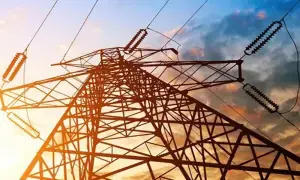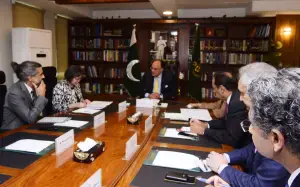IMF hasn’t set any condition to convert net metering to gross metering: minister
3 min readThe International Monetary Fund, which is in Pakistan for talks with the government on a new bailout package, has not set any condition to convert net metering to gross metering, Energy Minister Awais Leghari has said.
In an interview with Geo News programme Geo Pakistan, Leghari said that according to the government estimates, the price of a 5kW solar system was much lower compared to the last two years and the recovery of the price charged on the solar system was happening in a very short period of time.
“The IMF has not set any condition to convert net metering to gross metering.”
His statement comes days after a media report said that Pakistan had notified the IMF that it intends to terminate the net metering policy for rooftop solar panels and replace it with gross metering, resulting in the sale of expensive grid electricity to consumers.
Under the gross metering policy, electricity generated by rooftop solar panels would be fed into the national grid. Owners of solar panels would then consume units from the grid, resulting in reduced monetary benefits for residential consumers. This new system would involve separate meters to measure in-house generation and consumption, as opposed to the current bidirectional meter that calculates both rooftop generation and grid electricity import during nighttime.
Due to the weakness of the transmission system, Leghari added that the per-unit rate of electricity increases by Rs2 to Rs3 and there were also “mafias and theft in power distribution companies, which leads to a difference of up to Rs5.”
The energy minister added that the government wanted to privatise some distribution companies which would result in the reduction of prices. He requested the public to invest in energy-efficient fans.
Last week, Leghari reaffirmed the government’s commitment to continue the net metering policy while acknowledging the need for a review through consultations.
In April, the confirmed the report that the government was planning to cut net metering buyback tariff for commercial and residential consumers who have installed solar systems.
It is worth noting that Business Recorder reported in the same month that the government is considering a reduction in net metering rates for solar panel buyers. Currently, through net metering, solar panel owners are selling electricity to distribution companies at Rs21 per kWh. The government intends to reduce this rate to Rs10.
Also, read this
CCPA ‘proposes’ tax on residential or commercial solar panel installations
Power Division clarifies reports of fixed tax on solar panel installation
Critics argue that taxing solar panel installations may hinder the country’s progress towards achieving sustainable development goals and discourage individuals and businesses from investing in clean energy solutions.
As the government reviews the proposal, renewable energy advocates and environmental organizations have urged policymakers to ensure that supportive policies and incentives are in place to encourage the adoption of clean energy technologies.
For the latest news, follow us on Twitter @Aaj_Urdu. We are also on Facebook, Instagram and YouTube.


























Comments are closed on this story.